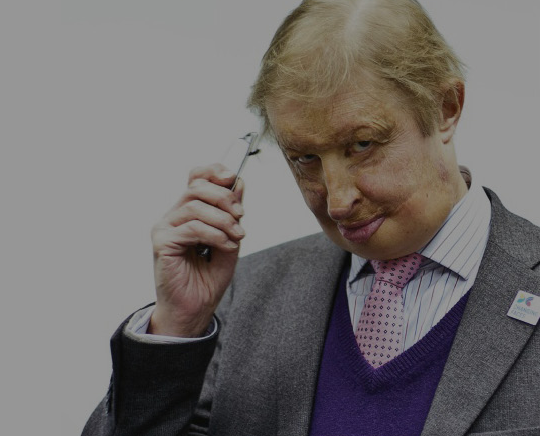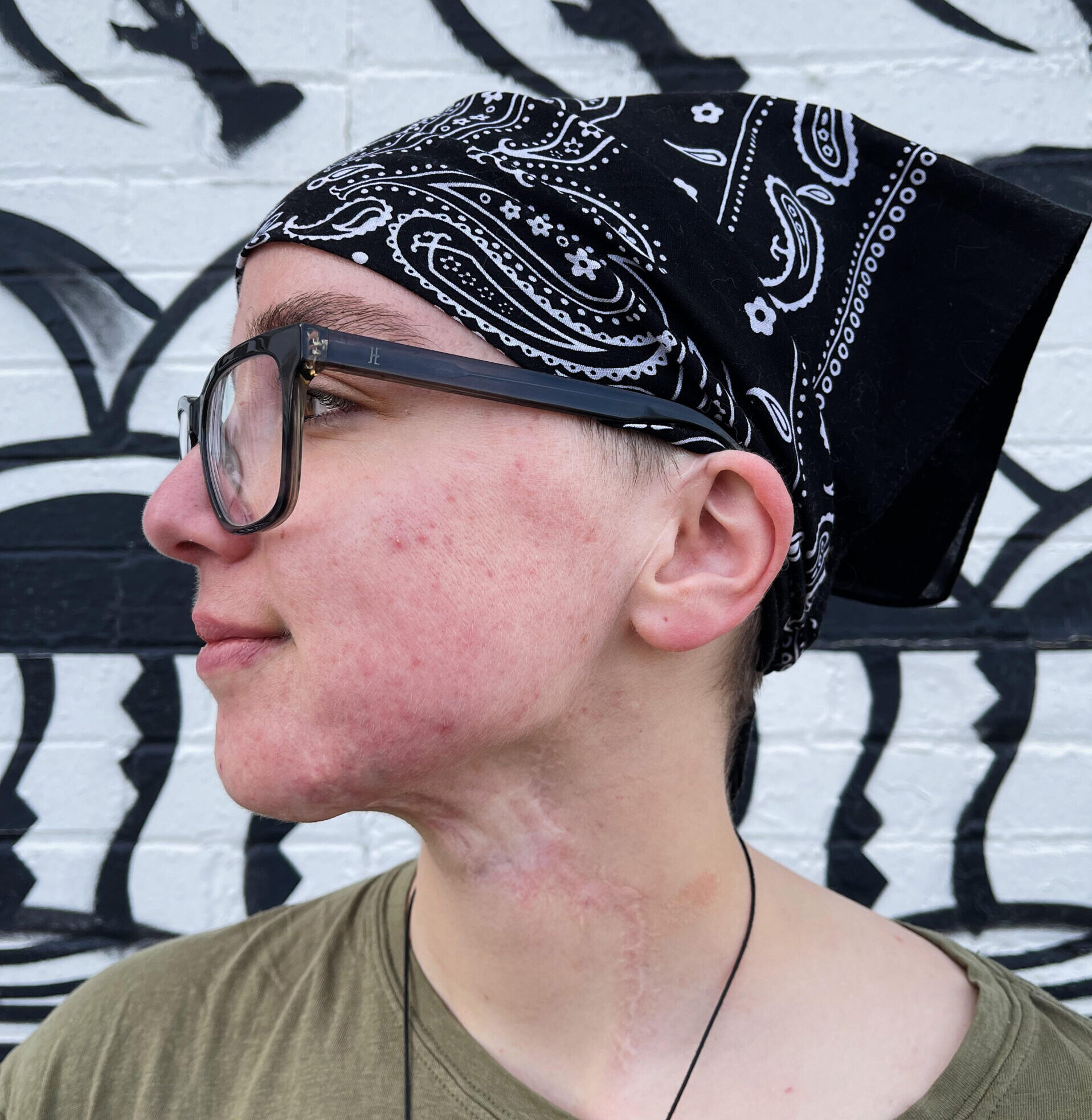GUIDANCE NOTE
IMPORTANT – PLEASE READ CAREFULLY:
This note summarises some questions which people in England and Wales may have when planning a return to work after a burn injury. It gives a general overview as at July 2023 but is not comprehensive and is for guidance purposes only. You should always seek legal advice on your particular circumstances.
The information on this page was collated by researchers at Queen Mary University London. At Face Equality we tend to use the term “facial difference”. However, this document uses the words disfigurement, severe disfigurement, impairment and disability, as these are terms used in the law. They may apply to you in a legal sense even if you don’t consider yourself to be disabled.
I’m unsure how colleagues will react to how my appearance has changed
You might want to consider talking to your manager, your colleagues, or HR about this.
Some people worry about being asked lots of questions about what happened. Usually questions from colleagues stem from curiosity or concern, especially if you have been off work for a period of time. However, people often don’t realise how difficult these questions can be and what they may be asking of you. We wouldn’t routinely ask people questions like ‘tell me about the worst day of your life’ or ‘tell me about your most traumatic or painful experience’ but this might be what they are asking of you.
When we have a traumatic experience, that memory is stored differently from our day-to-day memories and so when we access this memory (as we do when we are asked a question) it can feel as if we are back in that moment. It is natural to want to avoid this. Explaining this to your manager can help them to understand why it might be helpful to give your colleagues some information before you return to work to limit the questions that you have to deal with.
One strategy you could discuss together is sending round a message to your colleagues before you return. Writing the message yourself, or asking to see it before it goes out, gives you control over how it is presented. If your employer is happy to do this, it can reduce the need for repeated explanations to everyone you meet when you go back in.
For example, your message could set out any of the following which feel appropriate to you:
- Thanks for any well wishes during your absence
- A brief summary of how you are feeling
- Whether you’re happy to talk about it or would prefer just to get on with work
- Any ways that colleagues can help make your return to work easier
- How you are looking forward to catching up with colleagues and hearing their news.
If you do receive questions about your injury when you return, one technique which works well for some people is ‘EXPLAIN / REASSURE/ DISTRACT’. It can help to practice this strategy first with someone you trust.
Example:
EXPLAIN: Explain to the other person to help them understand e.g. “It’s a scar from a burn injury.”
REASSURE: Reassure the other person e.g. “I am much better now and recovering well thank you.”
DISTRACT: Change the conversation to one you feel comfortable talking about e.g. “Do you think the rain will clear up this afternoon?” or “what have I missed at work?” This lets the other person know that you no longer want to discuss your injury.
You could also talk to your employer about running some refresher training to staff about diversity and inclusiveness, including a section on appearance equality.
Spending some time planning for your return can be useful too. Think about the different aspects of your working life – e.g. how you will get there, who you will see (not just those people you work closely with). Feeling prepared for every step in the day can help your return go smoothly. Meeting up with any close friends from work socially before your return can also be a good way to ease yourself back in.
How can I get my employer to understand my condition properly?
The thought of discussing your condition with your manager can be unsettling, especially when you may still be working out what it means yourself.
There probably isn’t one single ‘right’ approach here – everyone’s work and medical situation is different. But here are a few suggestions to consider:
- Think about who you want to speak to. While meeting your manager to talk about practicalities might be OK, you may feel more comfortable discussing relevant medical details with someone from HR or Occupational Health. Most managers won’t take offence if you explain that you’d like to keep some of the medical details separate from your daily work life. Your employer may ask for your consent to seek advice from Occupational Health to help them understand the impact of your injury on you. See the ACAS website here for more information about Occupational Health referrals.
- Consider whether it would be helpful for your doctor or someone with close knowledge of your medical care to speak to your employer on your behalf. If so, be clear with this person in advance if there are any details which you would wish to keep private. If your employer requests a report from your doctor, you may have rights relating to it – such as the right to see it. See the ACAS website here for more information.
- Have a look at the resources on the Changing Faces website for other ideas.
Can I get some changes made to my role or uniform to help me return?
If you are a disabled person for the purposes of the Equality Act 2010, your employer may be under a duty to make reasonable adjustments to avoid you being substantially disadvantaged due to your burn injury in certain respects. This applies where the employer knows (or ought reasonably to know) about both the disability and the substantial disadvantage. A change to your uniform (perhaps to cover or prevent irritation of your injury) or to particular role duties (e.g. to avoid aggravating an injury) may, depending on the context, be a reasonable adjustment that your employer would need to make. Note that your employer is not necessarily obliged to agree to all of your adjustment requests and could also suggest alternatives.
| Am I disabled under the Equality Act 2010? To be a disabled person under the Equality Act 2010, you need to have an impairment (e.g. burn injury) that: a) has a substantial adverse effect on your ability to carry out normal day to day activities; or b) consists of a severe disfigurement. (This (b) applies even if your visible difference has no impact on what activities you can do, or on your mental health). In both cases, it must have lasted, or be likely to last, for at least 12 months (or for the rest of your life). A serious burn injury could potentially qualify under both of these tests, but the assessment is individual; what matters is not whether you’ve got a burn injury but how that injury manifests itself in your case. You can find more guidance about what these tests mean on the Citizens’ Advice Bureau website here or on the EHRC website here. You can also ask us for a copy of our equality guidance note which contains additional guidance on this point. Your legal adviser can help you understand whether you are likely to meet either of these tests as a disabled person, and also whether your work status (as an employee, worker, apprentice etc…) falls within the scope of the Equality Act 2010. Please note that different definitions of disability may apply in other contexts e.g. for the purpose of qualifying for some social security benefits. |
If your injury does not amount to a disability, the employer’s duty to make reasonable adjustments does not apply, but your employer may still be willing to make some changes to help you. To help the conversation go well, it might assist if you are able to explain:
- why you would like these changes e.g. ‘the fabric of the uniform aggravates my skin injury’.
- if you can propose a good alternative e.g. ‘I have a long-sleeve cotton shirt of the same colour as the uniform which I could wear instead’.
- whether this change would need to be permanent or could be reviewed in due course.
If you feel your employer is behaving unreasonably, seek legal advice about your options without delay.
Can I return part-time initially?
Unless there is anything in your employer’s policies and procedures which allows you to return part-time, one or more of several routes might be useful:
a) the law says that employees with at least 26 weeks’ service can request a flexible working arrangement. This could include a temporary (or permanent) reduction in hours.
b) If your burn injury amounts to a disability under the Equality Act 2010, a reduction in hours could be a reasonable adjustment which your employer is required to make.
c) Even if neither of the above apply, you can still make an informal request to your employer for some temporary adjustments to help you return to work.
These three options are explained in more detail below. Note, though, that a reduction in hours may result in a pay reduction too, so you should discuss this with your employer in advance to understand the financial implications.
Flexible working request[1]
An employee with at least 26 weeks continuous service has the right to request flexible working – either temporarily or permanently. Only one formal request can be made in any 12-month period and there are some other exceptions about who is able to apply. (See footnote below – these requirements will soon be changing).
If you are eligible to make a formal flexible working request, you should put your request in writing, with the date on it. Your request should specify:
- that it is an application made under the flexible working statutory procedure.
- what change you are seeking and from which date. If your request is for a temporary reduction only, make this clear and specify when you anticipate returning to your normal hours.
- What effect you think it might have on your employer and colleagues and how this could be dealt with.
- Whether you have made a previous request and when.
This is only a right to request – not a right to have your request granted – but it does require your employer to consider your request and respond (usually) within 3 months, unless otherwise agreed. A request can be refused on a number of grounds. You can find out more about this process and possible outcomes here.
Reasonable adjustments if your burn is a disability
The law requires an employer to make reasonable adjustments where some kind of practice or physical feature of the premises puts a worker with a disability at a substantial disadvantage compared with other people. This applies where the employer knows (or ought reasonably to know) about both the disability and the substantial disadvantage. If you are a disabled worker, a temporary reduction in hours could be a reasonable adjustment which your employer is required to make. This may depend on a number of factors including:
- how well the reduced hours would work
- how practicable it would be
[1] Changes to the rules on flexible working requests are due soon, probably in 2024. Once this happens, you will be able to make up to 2 flexible working requests per year, employers will have to ‘consult’ with you before rejecting any request, and employers will be required to make a decision within 2 months of the request. In addition, the law is also intended to change to allow you to make a request from day 1 of employment. There will also be some changes to the process which has to be followed.
- the cost and extent to which it would disrupt the business
- your employer’s resources and whether financial assistance is available to them
- the nature and size of your employer’s business.
In many contexts, a request for a temporary reduction in hours to facilitate your return to work could be a reasonable adjustment. But do note that reducing your hours may reduce your pay so seek clarity from your employer first. Also note that your employer is not always obliged to agree to your adjustment requests and may sometimes suggest alternatives.
There is no set process to request a reasonable adjustment but you can combine this with a flexible working request by specifically mentioning reasonable adjustments in your request.
Informal request
If neither of the above routes are open to you, you can still make an informal request to your employer for a temporary reduction in hours to facilitate your return to work. In practice many employers are willing to agree reduced return to work measures to assist an employee’s recuperation. Your employer may ask for some evidence to support your request. You may have a right to see any GP report – see the ACAS website here for more information. GPs have the ability to issue a ‘fit to work’ note which includes recommended adjustments, so it might be worth discussing this with your doctor. Similarly, your company may ask for your consent to refer you to an occupational health adviser for assessment, so this may be an opportunity to discuss phased return to work measures.
If you feel your employer is being unreasonable in its stance, seek legal advice without delay.
Am I entitled to take time off work to attend medical appointments?
Unless provided in your contract, once you are fit to work there is no general right to take time off for medical appointments (save for antenatal appointments). So time off for medical appointments is usually at your employer’s discretion.
However, if the medical appointment is required due to your disability, the duty to make reasonable adjustments may in some circumstances require your employer to permit you time off for the appointment. This time off may not be paid so seek clarity first.
What other kinds of reasonable adjustment might be relevant for a disabled person with a burn injury?
This all depends on the context of your work, your injury and your employer’s business. However, adjustments which might be relevant for some people include:
- adjustments to hours e.g. reduction in working hours or flexible hours
- the ability to work from home when needed
- an adjustment to any Teams / Zoom policies, allowing the individual to use ‘audio’ only if desired
- uniform adjustments (e.g. looser clothing, different fabric, long-sleeves etc)
- somewhere quiet to apply topical medication / change dressings if needed
- a locker to keep any medicines needed at work
- adjustments to duties (including moving to a non-customer-facing role for a period of time if desired)
- a mentor for difficult days
- time off for medical appointments and / or psychological therapy
- If you are looking for a job, the duty to make reasonable adjustments can apply in respect of some of the recruitment process too.
You may wish to seek advice from your burns physiotherapy/occupational therapy teams about adjustments that they would recommend in your specific situation.
My doctor says I’m not ready to return but I need the money. Can I come back early?
If you can, it’s better to wait until your doctor agrees that you are ready to return. However, you can talk to your doctor and employer about any measures which might make it possible for you to return earlier – such as a phased return, additional breaks to apply medication, home-working, alteration of job duties, etc.
In terms of financial assistance in the meantime, consider:
- Have you got any remaining entitlement to sick pay?
- Check whether you have built up any paid holiday entitlement which you may be allowed to take while off sick.
- Are you entitled to any state benefits? The Citizens Advice Bureau can offer advice on entitlements. See here.
- If you are a Trade Union member, check whether your union has a financial assistance / hardship scheme.
- Check whether you are owed a tax refund. See the Citizens Advice Bureau website here.
- There are a few other financial assistance ideas on the Money Helper website here.
Your employer may not be willing to allow your return against medical advice either – this will depend on factors such as the outcome of any risk assessment or Occupational Health assessment undertaken. If you want to return but your employer prevents you from doing so, you should seek legal advice without delay.
My injury happened at work. I’m worried about returning in case it happens again.
This is a very valid concern. You should seek legal advice and/or speak to your Trade Union to get support in ensuring that sufficient safeguards are in place to prevent a recurrence when you return. You may also wish to seek legal advice to see whether you would qualify for any compensation as a result of an injury sustained at work. Due to time limits that may apply, if you are looking to do this you should seek advice without delay.
Sometimes returning to the situation/environment where a traumatic event took place can be very difficult and bring back painful memories. In this situation, seeking support (e.g. talking to a trained specialist such as the psychologist in your burns team) can be very helpful.
If I apply for a new job, do I need to disclose my injury on my application?
Not always. Prior to deciding who to offer a job to, an employer shouldn’t usually ask health-related questions (although there are some exceptions when this is permitted).
One permitted exception when employers can ask health questions during recruitment is when the employer needs to ask about any adjustments required for interview. If you need any adjustments during the recruitment process related to your burn injury, you may need to disclose your disability on the form.
Another permitted exception is where an employer needs to monitor applicants as part of its diversity commitment – but information obtained for this reason should then not be taken into account in the recruitment process itself, and the shortlisting manager should usually not see the diversity information at this stage. For detail about the other occasions when it’s OK for an employer to ask about your health before offering a job, click here to read the guidance on this point.
Some job applicants choose to disclose a visible difference. There probably isn’t one ‘right’ approach here and it will be about what feels most comfortable or appropriate for you and your situation. Some people may feel more comfortable on the day of interview if they have disclosed a visible injury in advance. Some may use it as an opportunity to explain that their injury doesn’t hold them back (perhaps via a small familiarisation video). And some may choose to disclose in order to use a guaranteed interview scheme (if available). Others may feel that disclosing before interview makes their injury, rather than their skills, too much of a focus and that this may count against them.
If you do choose to volunteer information about your injury (as opposed to answering permitted questions such as those set out above), and unless a relevant guaranteed interview scheme applies, we usually suggest that you wait until after you are shortlisted for interview before doing so. This is so that you can be clear that disclosing your visible injury on your application form has not affected or reduced your chance of being interviewed.
Once a decision to appoint has been made in principle, some employers may make a job offer conditional upon satisfactory answers to relevant health questions (often via a medical questionnaire). These should be answered honestly. The employer must not use this information as a basis for discriminating against you.
Take legal advice without delay if you think you have not been appointed due to your burn injury.
How can I ensure my injury doesn’t stop my career progression?
If you feel that they will be receptive, have an honest conversation with your employer about this. Some managers might tend to ‘go easy’ on you for a while after an injury on the assumption that this will help you. If that’s not what you want or need, be honest about that. Having a conversation with your manager can sometimes prevent inaccurate assumptions from getting in the way and give you the opportunity to set the tone for your return.
Having said that, it’s important to be honest with yourself about how you are feeling. Try not to compromise your recovery by taking on too much too soon. A good manager should understand that even a committed and talented employee may need a gradual reintroduction after a significant injury.
If you feel that your employer is side-lining you or removing responsibilities from you unnecessarily (e.g. moving you away from a customer-facing role due to a visible injury despite you making clear that you want to continue working normally), seek legal advice without delay.
What is the best way to deal with customers who don’t know me or what happened?
Many people with a burn injury report the potential for awkwardness in their interactions with strangers. Often people stare due to unfamiliarity rather than through any ill intent, but it doesn’t make it any easier when they do. It’s natural to want to avoid this awkwardness, and we have set out below some strategies that some people have used in the past. But also remember that it is not your responsibility to put other people at ease with your injury.
Strategies include:
- Being socially confident in your interactions can reduce the potential for awkwardness. Have a read through the guidance on the Changing Faces website about this, or look through some survivor stories. Some organisations run social skills training sessions too so look out for a course in your area.
- Plan a response to any intrusive questions about your injury. This could be a very quick explanation (‘I am a burn survivor’) or a deflection (‘I’d rather talk about how I can help you today’). Knowing what to say in advance can help you feel in control. Using the EXPLAIN / REASSURE / DISTRACT technique set out above can be very helpful.
- If you need to, ask a colleague to hold the fort for a few minutes while you step away from a customer who is making you feel awkward.
Sometimes, inappropriate behaviour can go beyond awkwardness and lead to abuse. We should all be able to do our jobs without being abused. Every situation depends on context, so it is a good idea to familiarise yourself with your employer’s policies and procedures in advance of any situation arising. Subject to that, we suggest that if you are subjected to verbal abuse at work by a third party:
- Remove yourself from the situation to a place of safety. If you can’t do that, attract the attention of a trusted colleague to support you.
- If you feel comfortable and safe doing so, you could tell the person calmly that you find their comments offensive and ask them to stop. However, this is a personal decision and you should not put yourself at risk either physically or emotionally in doing this. It is not your responsibility to confront other people’s unacceptable behaviour.
- As soon as possible, tell your manager or someone from HR what happened. If you can’t speak to someone straight away, you may want to make a note of what was said to remind you.
- Think about whether there are any steps which your employer could take to prevent a repetition. This could include displaying signs setting out the company’s standards on respect at work, taking steps in relation to customers who breach these standards, and increasing safety and support procedures.
- If your employer knowingly puts you at risk of abuse or does not take your concerns seriously, seek legal advice without delay.
- If you believe the verbal abuse was motivated by hostility or prejudice towards you because of a disability, it may constitute a hate incident or even a hate crime. These can be reported to the police. See the Citizens Advice Bureau website here.
Where can I get legal advice?
Below is a list of organisations which may be able to offer guidance or free legal advice on this topic. Always check whether you will be charged for the advice in advance.
- Citizens Advice Bureau
- Equality Advisory and Support Service helpline
- Local law centres (find your local one here).
- EHRC provides guidance and support on discrimination issues https://www.equalityhumanrights.com/en
- ACAS (https://www.acas.org.uk/) also have some useful guidance for employees in the workplace
Alternatively, you could consult a solicitor local to you who specialises in employment law (always check the cost basis before doing so).
Do not delay seeking legal advice where needed, as short timescales can apply for legal action to be taken.
I am an employer. How should I support one of my workforce who has a burn injury?
This guide is aimed at individuals rather than employers. Click here to read our model of good practice for employers about how to create appearance-inclusive workplaces. You may also find the following resources useful for good employment practice:
https://www.acas.org.uk/advice
https://www.equalityhumanrights.com/en/advice-and-guidance/equality-act-codes-practice
Acknowledgments
This guidance was produced by researchers at Queen Mary University London, with grateful thanks to:
- Dr Katherine Nutt, Senior Clinical Psychologist, St Andrews Burns Centre, Broomfield Hospital, Mid and South Essex NHS Foundation Trust
- The VTCT Foundation
- The Centre for Appearance Research at the University of the West of England
- Jessica Hunt and Claire Burton from Leigh Day solicitors
Updated July 2023










